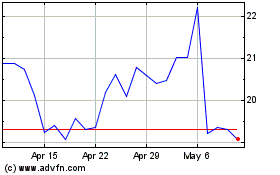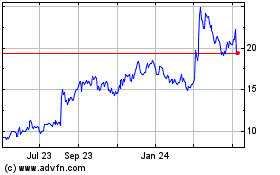HONG KONG—China's internet-finance heavyweight, Ant Financial
Services Group, is expanding overseas.
The financial affiliate of Chinese online-shopping giant Alibaba
Group Holding Ltd. is forging partnerships in the U.S., Europe and
Asia, building a global network of merchants that accept its
payment services. On Tuesday, it is set to announce a tie-up with
the online-payments arm of Thai conglomerate Charoen Pokphand
Group, people familiar with the situation said.
For now, those overseas services are aimed at a surging number
of Chinese tourists who use Ant Financial's Alipay mobile-payments
application at home. But by distributing its technology platform to
retailers world-wide, Ant is laying the groundwork for what could
eventually be a challenge to Visa Inc. and MasterCard Inc.
"I was surprised to see Alipay" at a 7-Eleven in Thailand, said
Li Na, a 33-year-old Chinese startup employee who used Alipay to
buy ice cream while vacationing on the island of Ko Samui in
August. "It was convenient." At home, Ms. Li said she uses Alipay
almost every day for shopping, dinner and taxis.
Alipay was created in 2004 to support transactions on Alibaba's
Taobao online-shopping site and grew alongside the e-commerce
business. It was later separated from Alibaba—an offshore company
with foreign investors—and reincorporated as a domestic company
under chairman Jack Ma's control, after worries that new
regulations could have threatened its ability to be licensed for
payments. Alipay accounts are linked to bank accounts, and users
move money into Alipay to pay bills, buy movie tickets and even
invest in mutual funds.
As Alipay grew, its became part of an umbrella holding company,
Ant Financial, that expanded into new businesses. The payment app's
huge user base and Alibaba's connections with merchants allowed Ant
to move into other financial services such as loans, money-market
funds and credit scoring. Alipay remains Ant's biggest business by
far.
Overseas, Alipay is accepted at more than 80,000 merchants in 70
countries, according to Ant. It has set a goal of one million
merchants in three years.
"Eventually, Chinese Alipay users wouldn't need to worry about
money exchange or discovery of local dining and shopping
information, wherever they go," said Jia Hang, an executive at
Alipay's international operations.
Ant has some powerful advantages as it rolls out its business
abroad. With more than 450 million users, Alipay dominates China,
the world's biggest e-commerce market, handling nearly half of the
estimated $738 billion Chinese spent online last year, according to
iResearch. Alipay processed 153 million online transactions a day,
on average, in the first quarter—almost 10 times more than PayPal
Holdings Inc., nearly as many as MasterCard and around 60% of the
volume of industry leader Visa, according to an Alibaba investors
presentation in June.
In China, where credit cards aren't as widespread as in the
U.S., hundreds of millions of consumers have turned to smartphone
apps such as Alipay, making China the world's biggest
mobile-payment market. Last year, mobile transactions in the
country more than doubled to $235 billion, pushing it ahead of the
U.S., which grew 42% to $231 billion, according to data provider
Euromonitor International.
Investors hung a $60 billion price tag on the company in its
latest fundraising round in April and bankers say a future initial
public offering—expected as early as next year—could raise as much
as Alibaba's $25 billion IPO and value Ant at around $100 billion.
A spokeswoman for Ant Financial said the company doesn't have a
timeline for the IPO, nor a preferred exchange on which to
list.
In May, the company hired a senior Goldman Sachs Group Inc.
banker, Douglas Feagin, to lead the push to build a network of
global partners.
The tie-up with Charoen Pokphand's Ascend Money Holding, fits
the pattern. The Wall Street Journal reported in June that Ant
would buy a 20% stake in the Thai firm for an unknown amount. Last
year, Ant Financial together with Alibaba paid more than $500
million for a 40% stake in Indian online-payment and e-commerce
firm Paytm.
In London, Harrods department store, a mecca for Chinese
tourists, accepts Alipay. Ant has also teamed up with partners such
as France's Ingenico Group SA, whose in-store payment system is
widespread among European merchants. Ant Financial is also working
with First Data Corp. and VeriFone Systems Inc. to tap more U.S.
merchants. Chinese travelers can use Alipay to pay for Uber
Technologies Inc. rides and shopping at San Francisco International
Airport.
Taking Alipay global isn't a slam dunk. Banking is a tightly
regulated industry, meaning Ant needs to pursue alliances, such as
the Ascend tie-up in Thailand or Paytm deal in India, to get access
to a local market. Wooing global consumers in markets where
credit-card use is widespread will likely be harder.
Competitors include rival Tencent Holdings Ltd.'s WeChat Pay at
home and Apple Inc.'s Apple Pay abroad. Tencent is gaining ground
in China thanks to the popularity of its WeChat messaging app,
which includes a mobile wallet. In the first quarter, Tencent's
share of China's mobile-payment market more than tripled to 38%
from a year earlier, while Alipay's share fell to 52% from 79%,
according to iResearch.
Alec Macfarlane and Julie Steinberg contributed to this
article.
Write to Kane Wu at Kane.Wu@wsj.com and Juro Osawa at
juro.osawa@wsj.com
(END) Dow Jones Newswires
October 31, 2016 12:35 ET (16:35 GMT)
Copyright (c) 2016 Dow Jones & Company, Inc.
Paymentus (NYSE:PAY)
Historical Stock Chart
From Mar 2024 to Apr 2024

Paymentus (NYSE:PAY)
Historical Stock Chart
From Apr 2023 to Apr 2024
